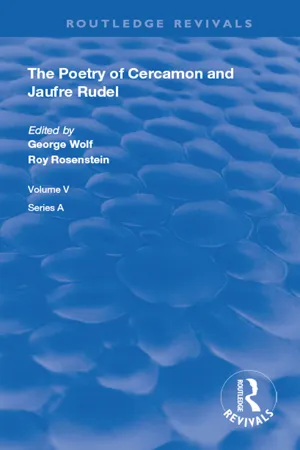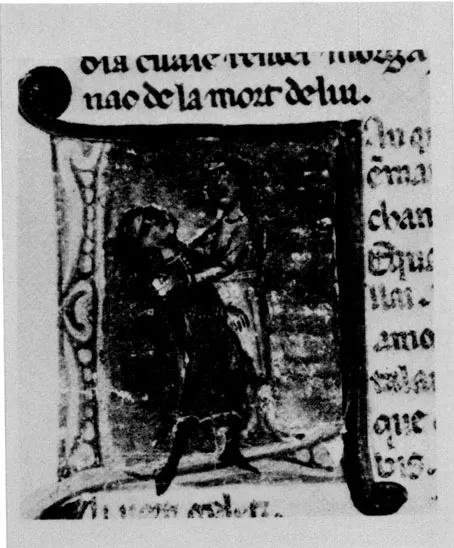
- 188 pages
- English
- ePUB (mobile friendly)
- Available on iOS & Android
eBook - ePub
The Poetry of Cercamon and Jaufre Rudel
About this book
Published in 1983, Wolf and Rosenstein have delved into the poetry writings in detail of Cercamon and Jaufre Rudel, with detailed textual notes on the poems, exploring the individual poets' lives and looking at the translation of the writings.
Frequently asked questions
Yes, you can cancel anytime from the Subscription tab in your account settings on the Perlego website. Your subscription will stay active until the end of your current billing period. Learn how to cancel your subscription.
No, books cannot be downloaded as external files, such as PDFs, for use outside of Perlego. However, you can download books within the Perlego app for offline reading on mobile or tablet. Learn more here.
Perlego offers two plans: Essential and Complete
- Essential is ideal for learners and professionals who enjoy exploring a wide range of subjects. Access the Essential Library with 800,000+ trusted titles and best-sellers across business, personal growth, and the humanities. Includes unlimited reading time and Standard Read Aloud voice.
- Complete: Perfect for advanced learners and researchers needing full, unrestricted access. Unlock 1.4M+ books across hundreds of subjects, including academic and specialized titles. The Complete Plan also includes advanced features like Premium Read Aloud and Research Assistant.
We are an online textbook subscription service, where you can get access to an entire online library for less than the price of a single book per month. With over 1 million books across 1000+ topics, we’ve got you covered! Learn more here.
Look out for the read-aloud symbol on your next book to see if you can listen to it. The read-aloud tool reads text aloud for you, highlighting the text as it is being read. You can pause it, speed it up and slow it down. Learn more here.
Yes! You can use the Perlego app on both iOS or Android devices to read anytime, anywhere — even offline. Perfect for commutes or when you’re on the go.
Please note we cannot support devices running on iOS 13 and Android 7 or earlier. Learn more about using the app.
Please note we cannot support devices running on iOS 13 and Android 7 or earlier. Learn more about using the app.
Yes, you can access The Poetry of Cercamon and Jaufre Rudel by George Wolf,Roy Rosenstein in PDF and/or ePUB format, as well as other popular books in Architecture & Architecture générale. We have over one million books available in our catalogue for you to explore.
Information
The Poetry of Jaufre Rudel

Illumination heading Jaufre’s poems in Manuscript I, B.N. fr. 854, fol. 121v, depicting the poet dying in the arms of the Countess of Tripoli. (Courtesy of the Bibliothèque Nationale)
Introduction
Life of the Author
Jaufre Rudel is one of the best known of the Old Provençal troubadours, who wrote in the south of France in the twelfth and thirteenth centuries. Yet we know little about this lord of Blaye, who lived in the second quarter of the twelfth century. More than his lyrics, it is the legend of his distant love that has inspired authors as varied as Petrarch, Stendhal, Rostand, Browning, Heine, Carducci, and their readers in turn. According to his thirteenth-century biography or vida (version of Manuscripts AB):
Jaufre Rudel, Prince of Blaye, was a very noble man. And he fell in love with the Countess of Tripoli, without having seen her, because of the great goodness and courtliness which he heard tell of her from the pilgrims who came from Antioch. And he wrote many good songs about her, with good melodies and poor words. And because of his desire, he took the cross and set sail to go see her. But in the ship he fell very ill, to the point where those who were with him thought he was dead. However, they got him—a dead man, as they thought—to Tripoli, to an inn. And it was made known to the Countess, and she came to his bedside, and took him in her arms. And he knew she was the Countess, and recovered sight [MSS. IK: hearing] and smell, and praised God because He had kept him alive until he had seen her. And so he died in the arms of the lady. And she had him buried with honor in the Temple at Tripoli. Then, the same day, she became a nun because of the grief which she felt for him and for his death.
Jaufres Rudels de Blaia si fo molt gentils hom, princes de Blaia. Et enamoret se de la comtessa de Tripol, ses vezer, per lo gran ben e per la gran cortesia qu’el auzi dir de lieis als pelegrins que vengron d’Antiocha. E fetz de lieis mains bons vers ab bons sons [et] ab paubres motz. E per volontat de lieis vezer, el se crozet e mes se en mar, per anar lieis vezer. Et adoncs en la nau lo pres mout grans malautia, si que cill qui eron ab lui cuideron q’el fos mortz en la nau. Mas tant feiron q’il lo conduisseron a Tripol, en un alberc, aissi cum per mort. E fo faich a saber a la comtessa, et adoncs ella s’en venc a lui, al sieu lieich, e pres lo entre sos bratz. Et el saup que so era la comtessa, si recobret lo vezer e·1 flazar, e lauzet Dieu e·1 grazi que l’avia la vida sostenguda tro qu’el l’agues vista; et enaissi el moric entre·ls braz de la dompna. Et ella lo fetz honradamenz sepeillir en la maison del Temple de Tripol; e pois, en aquel meteus dia, ela se rendet monga, per la dolor que ella ac de lui e de la soa mort.
This account, retold in every century since Jaufre’s, fits in to some degree with what we can infer historically about the poet. We know that Jaufre Rudel was, as the vida claims, one of a line of lords (princes) who held land roughly within the square of territory formed by Saintes, Angoulême, Bergerac, and Bordeaux in the southwest of France. Just north of Bordeaux is the castle of Blaye, built on an escarpment dominating the Garonne River on its right bank. Because of its link to Roland, the Carolingian hero of Roncevaux, Blaye was a popular site on the pilgrimage route to the shrine of St. James at Compostela in northern Spain. However, little remains of the medieval citadel built, according to at least one legend, over Roland’s tomb.
Since the end of the tenth century the troubadour’s ancestors had held Blaye (according to Cravayat; see Select Bibliography for all sources). The first of them to be named Jaufre Rudel did homage both to his cousins, the Counts of Angoulême, and to his overlords, the Counts of Poitiers, late in the eleventh century. Over succeeding generations the House of Blaye was periodically at war with the Houses of Angoulême or Poitiers, or both. In the twelfth century the first known troubadour, William, VII Count of Poitiers, IX Duke of Aquitaine, seized the castle from Girard of Blaye and destroyed its walls and dungeon, as we are told in the anonymous History of the Bishops and Counts of Angoulême (ed. J. Boussard, p. 33). It was not until the time of Count William’s son, William VIII (d. 1137), mourned by Cercamon in his Lo plaing comenz, that Blaye was recaptured and rebuilt by Wulgrin II, Count of Angoulême, and restored to his vassal Girard or Girard’s son, the troubadour Jaufre Rudel.
We learn from the Cartulary of the Priory of Sainte Gemme (Cravayat) that Jaufre succeeded to his father’s title and castle. Although the original charter has been lost, a late seventeenth-century transcription tells us that it was Jaufre Rudel who at an undetermined date fulfilled some of his late father’s obligations toward the priory. With the earlier document signed by Jaufre, his brother, and his father, this is the only historical evidence by which we can identify a Jaufre Rudel, lord of Blaye (dominus Blaviae) in the second quarter of the twelfth century. It should be mentioned, however, that there are also later descendants named Jaufre Rudel attested as lords of Blaye until almost the middle of the fourteenth century (see the article of P. Julien-Laferrière). Early scholars sought to identify the poet with one of these descendants, but Jaufre has since been restored to his proper period.
The first historical reference to the poet Jaufre Rudel is by the troubadour Marcabru, who sends one of his songs encouraging the French crusaders “to Lord Jaufre Rudel overseas.” There is no reason to doubt that his dedicatee is the Jaufre Rudel we have described, and that Jaufre took the cross to participate in the Second Crusade, as his vida relates. That Jaufre went on crusade is further supported by what we know of the men with whom Jaufre was in contact, three, possibly four, of whom he refers to in his poems.
One of the poet’s references is to his “Good Protector” (5.33), and suggests William VI Taillefer, Count of Angoulême (1140–79), Jaufre’s cousin and suzerain. In the passage mentioned, Jaufre may be interpreted as implying that it is thanks to his “Good Protector” that he is able to go on crusade. William VI embarked with Alphonse-Jourdain of Toulouse from Port-de-Bou in the summer of 1147, made stops in Sicily and at Constantinople, and landed at St. John of Acre in the Holy Land on April 13, 1148. ...
Table of contents
- Cover
- Half Title
- Title Page
- Copyright Page
- Original Copyright
- Table of Contents
- I. The Poetry of Cercamon
- II. The Poetry of Jaufre Rudel